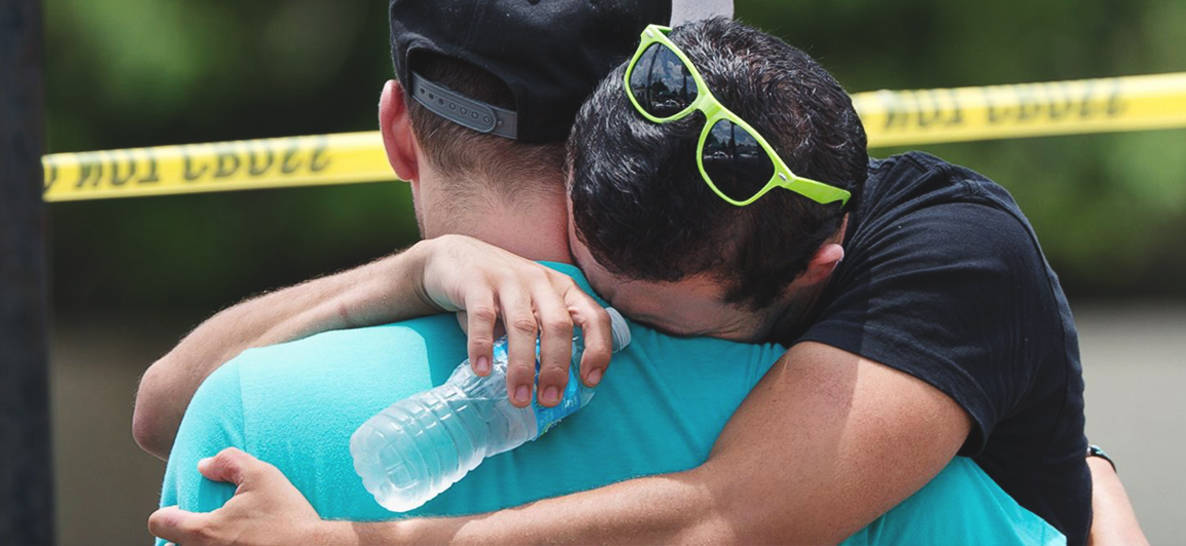
I don’t need to tell you what happened in Orlando, Florida, yesterday.
If you’ve been near a TV or the Internet or a church building, you saw the news: During the early morning hours Sunday (Saturday night), a man walked into a popular gay club near downtown and opened fire. The shooter, Omar Mateen, killed at least 49 people and injured 53 more.
Mateen, who died in a shootout with police, apparently pledged allegiance to the Islamic State before beginning his massacre.
Domestic terrorism. Gun laws. Tolerance toward sexual minorities. ISIS. Yesterday’s shooting was one issue away from being a collision of every hot-button topic in American culture, all in one public tragedy.
Predictably, reactions from both sides of the political spectrum arrived quickly.
Politicizing Tragedy
When a national tragedy happens, a familiar pattern emerges. People on different sides of a given political or cultural debate make sure everyone within range knows exactly why their particular points of view could fix this tragedy or might prevent another in the future—often in the most heated way possible. Typically, this takes the form of righteous indignation (but honestly it typically sounds like an agenda-driven way to shame anyone who might disagree).
Then, pundits start bemoaning the politicization of tragedies. These events, they say, can’t be reduced to anything else: A loss of life like this is a public tragedy and that’s all. It’s a form of backlash against backlash.
Yesterday we saw both in full force. Every other post streaming down my Twitter feed called for stricter gun control laws. And the ones that didn’t called for stricter immigration laws, the need to double down on ISIS or some kind of suppression of Islam.
Over at Slate, writer Katy Waldman raised the question, “What’s wrong with politicizing tragedy?” She (rightly) points out that “Crying ‘politicization’ is itself politicization—a way to advance whatever slate of politics favors the status quo.”
But she continues:
Often people invoke policy goals in order to get things done; what’s at stake is whether these tragedies should be regarded as irreducible lightning strikes or problems with potential solutions.
…As these lethal incidents recur, echoing each other down the years, Americans should put their pieties on hold and honor human pain through actions, not just words.
Waldman says, essentially, that decrying the politicization of the Orlando shooting represents actionless words—but calling for political action equates to learning from the event and (hopefully) securing a better future.
We’ve seen versions of this “less talk, more action” idea following a tragedy before. At least for Christians, it’s a problematic idea.
‘Active Faith’ Amid Tragedy
No one can deny that most people calling for “action instead of words” are actually calling for words about action. After all, only a minuscule fraction of the American population is in any position physically “do” anything about these kinds of tragedies, political or otherwise (and on that note, the city of Orlando did some amazing things yesterday, and those things will continue). For most of us, words are all we really have.
The issue becomes how we use these words.
When we think about the Christian faith in action, we naturally think about the Book of James. In this book, we read famous verses like, “Faith by itself, if it does not have works, is dead.” That’s why some people are surprising to realize that James is also the writer who says, “Everyone should be quick to listen, slow to speak and slow to become angry.”
Later, in 2:26, James writes, “Those who consider themselves religious and yet do not keep a tight rein on their tongues deceive themselves, and their religion is worthless.”
Not surprisingly, James isn’t gentle. And his pointed words aren’t simple, either. He is calling Christians to an active faith. But unlike the hyper-immediate world we live in, what characterizes the active faith we read about in James isn’t a spew of words (even when those words are true).
What Really Happened in Orlando
When Mateen started shooting people inside Pulse nightclub Sunday morning, he aimed at people who carry the image of God. For one reason or another, he played God and determined that those partying inside Pulse no longer deserved to live—and he became the judge and jury for at least 49 people.
Sunday’s shooting struck close to home for a lot of people. (For me, it was a little farther than 6 miles from where my wife and I slept.) Yes, Mateen’s massacre represents an attack on Orlando, the broader LGBT community and on a country established by the ideas of free conscience, speech and expression. But deeper than that, Mateen attacked the order of creation itself—and more than 100 of God’s individual creations.
We need to see this kind of violence for what it truly is: evil at the cosmic level. When we do, we see that the Orlando shooting is about the 49 slain people; it’s also about the 53 injured right now.
And, it’s about the age-old battle of good versus evil.
So, of course, “just words” aren’t enough. And, frankly, the “action” of typing Tweets that call for new policy isn’t enough, either.
The Problem With Politicizing Tragedy
The problem with politicizing the Orlando shooting isn’t necessarily one political agenda or another. We really do have to learn from what happened early Sunday morning. And, God willing, that will mean looking closely at all kinds of things—from access to assault-style guns to security at nightclubs to the way we treat the LGBT community to the domestic threat of ISIS and Islamic extremism.
But to pretend these kinds of localized issues should be the sum of what happened doesn’t honor the dead: It reduces victims and their families to chips on a 2016 political table.
In reality, these lives mean eternally more than that, and they matter far beyond this year’s cultural concerns.
The Nuance of a Christian Perspective
An active faith, according to James, means exercising the discipline to listen first and “act” second.
In this case, this means listening to victims of the Orlando shooting and what they actually need right now. That kind of listening sent droves of people to blood banks yesterday and to online donation sites. And that kind of listening sent thousands to prayer services and vigils last night and today—and will send countless more in the coming week.
This will mean listening to our LGBT neighbors about their pain and fear surrounding the shooting. And then it certainly means acting on what we’ve heard. Because listening without action is pointless.
But our actions aren’t to pimp a mass shooting to get our political or cultural agenda across. Our actions are to demonstrate care and compassion to hurting people, to hear the stories of those suffering and then—when we finally do speak—to speak humbly, as James says, about the Word that saved us.






















